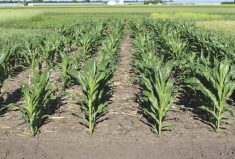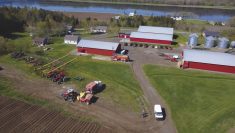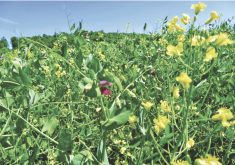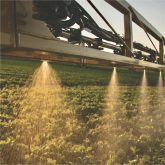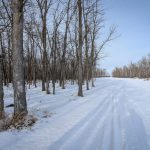Why are Lana Shaw and her colleagues having trouble securing funding for intercropping research?
For one thing, funding is generally tight in public ag research. The South East Research Farm receives $75,000 a year for core operations, as do the other research sites in the Agri-ARM network. On top of that, surrounding municipalities have kicked in $30,000 to the South East Research Farm. However, oil prices and government cutbacks mean that municipal funding is far from a sure bet in the long run.
On top of that, research managers like Shaw spend a chunk of time writing research proposals to funders. But that project funding doesn’t cover things like infrastructure or machinery.
Read Also

When hackers hit the barn
As Canadian farmers embrace automation, cybersecurity is the new front line. Here’s how to protect your on-farm data from digital threats.
Lack of long-term funding also affects staffing. In the last few years, Shaw has hired a summer student as an agronomist. She’d like to offer him a full-time, year-round position with some security, but she needs to find the funding for that first.
There’s an ongoing debate about what should be privately and publicly funded in ag research, says John Groenewegen, an ag and food consultant based in Guelph, Ont.
Traditionally, the public sector funded ag research. “And if you can capture the economic benefits the private sector will jump in real quick, as they do,” says Groenewegen.
But these days, ag research doesn’t rank as high as other areas such as health care with government funders.
“Agriculture gets the squeeze in many areas, unfortunately,” says Groenewegen.
That partly explains why agronomic research gets left in the lurch. Still, producers are paying check-offs to commodity groups that fund research themselves. Groenewegen says it makes sense that producers pick up the tab for some of the traditionally publicly funded research because they benefit.
“There’s a collective self-interest to fund it. Clearly there are other beneficiaries than just the farm sector, but they’re one of the larger beneficiaries of some of this research,” he says.
Groenewegen says the check-off system will likely remain until another funding model emerges.
The commodity check-off system is based on individual crops. Shaw says working with two crops at once doesn’t fit well into that system. It causes something like a “does not compute” error, she says.
“The current commodity groups tend to be reactive to problems and intercropping is seen as both a long-shot in terms of producer uptake and a utopian oddity by many,” Shaw adds.
Shaw is still optimistic that intercropping will find a funding patron in the public system. At interview time she was working with colleagues on preliminary proposals for the Ag Development Fund. Last year the Ag Development Fund distributed over $7.7 million to crop research projects in Saskatchewan, covering everything from Pasmo resistance in flax to monitoring soil organic carbon.
Shaw also sees crowdfunding as a way to show funders that farmers are committed to implementing the research. She thinks #AdoptAPlot could be a way to evaluate new ideas each year that funders see as a poor risk, but that farmers are interested in.
Says Shaw, “I’ve had some positive comments from frustrated researchers from small organizations across North America, and it wouldn’t surprise me if we start to see more of this by other researchers.”




